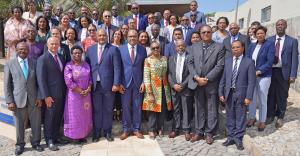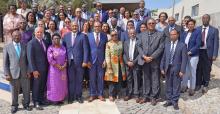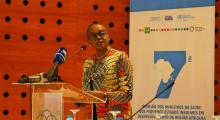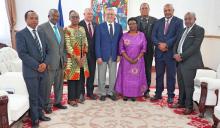African island nations commit to strengthen health systems and cooperation
The African Small Island Developing States (SIDS) gathered in Cabo Verde for the Seventh Health Ministers Meeting committed to work together to mainstream health in the broader development agenda at national and continental level. The meeting facilitated by the World Health Organization (WHO), brought together ministers and senior officials from Cabo Verde, Comoros, Guinea-Bissau, Madagascar, Mauritius, Sao Tome and Principe and Seychelles.
WHO Regional Director for Africa, Dr Matsidisho Moeti, reiterated commitment to continue supporting the African islands and acknowledged the progress achieved in implementing the recommendations from the previous ministerial meeting. “We have made progress on national health accounts and health financing, and we need to do more to implement recommendations on food and nutrition, vector-borne diseases, and illicit drug use,” said Dr Moeti.
The ministers recognized WHO’s role as SIDS secretariat and urged continued support for its operations as well as in implementing the programme on pooled procurement of strategic medicines, critical vaccines and other medical products. The agreement is expected to be formally signed during the next World Health Assembly in 2020.
The meeting in Praia concluded with the Cabo Verde Declaration which encourages improvements in universal health coverage (UHC), with a focus on access to quality care, equity and financial risk protection.
The Declaration also highlighted the importance of accelerating the response to noncommunicable diseases within the context of UHC and multisectoral actions, including reducing illicit drug, alcohol and tobacco use; as well as the implementation of the SIDS action plan on Health and Environment 2019-2023. Due to the nature of the small islands, it is critical to strengthen public health emergency preparedness and response by integrating the health system in the national development agenda.
The ministers also agreed that procurement of quality medicines and medical products is a significant contributor to the cost of health in the SIDS and called for WHO’s support. They also expressed concern over the growing consequences of climate change, the prevalence of noncommunicable diseases risk factors such as tobacco and illicit drug use is associated with blood borne diseases such as hepatitis C and HIV/AIDS.
The 4–6 December ministerial meeting in in Praia also discussed topics including strengthening collaboration within the SIDS network, pool procurement of medicines, UHC and SDGs in the context of SIDS, non-communicable diseases and health promotion, climate change and emergency preparedness. The meeting also included field visits to main pharmaceutical facilities.




